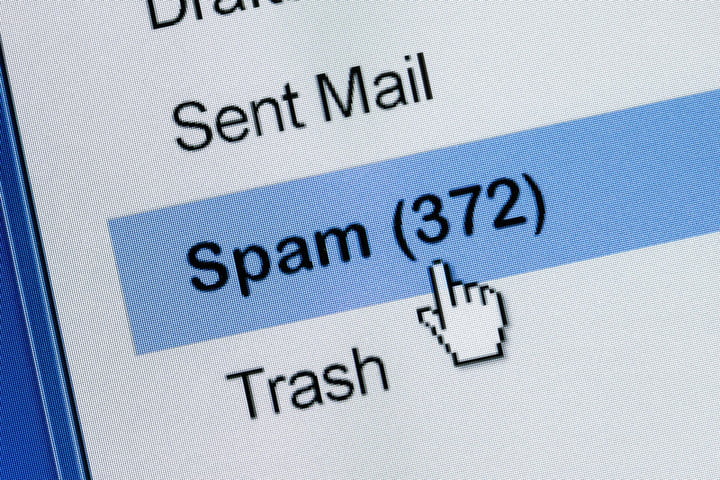#1 Cybersecurity services for Healthcare
89% of healthcare providers have suffered some type of data breach within the past two years.
Got too much Spam in your inbox? Phishing attacks becoming more frequent? We can help you.
The healthcare sector mainly consists of businesses that provide medical services, create medical equipment, and develop the drugs that fill our prescriptions. It is a gold-mine for big data that contains sensitive information about patients like date of birth, addresses, medical records, and so much more.
We’re the original email experts. 365 Defender provides cybersecurity services to small businesses specializing in the healthcare industry.
365 Defender has been protecting medical companies against hacked email accounts, spear-phishing, and data leaks for over twenty years. Our healthcare clients rely on our security experts to keep their confidential data safe, and to ensure secure communications via email.
Services that we offer:
Email Security for Outlook and Gmail
Email Archiving
Email Encryption
Secure file sharing
DNS Management
Managed Email Hosting
Email outage protection
SMS Forwarding
IT Consulting
Ready to secure your medical office? Simply visit our website for pricing and service plan options.
www.365defender.com
Law firms big target for hackers, but why?

Law firms are having a hard time adopting new technologies, and it’s causing them to become soft targets for hackers. The legal industry is vulnerable to cyber-attacks more than most other industries for several reasons. To be fair, 7 out of 10 businesses are unprepared to deal with a cyber-attack. For cyber criminals, the legal sector is a very lucrative target – and today, we’re going to explore the main reasons why cyber-attacks are on the rise.
Cybersecurity is not a priority
First, law firms have not really taken cybersecurity that seriously, it is more like an after-thought despite the rise in cyber-attacks. It’s not that lawyers don’t believe in security; it is just that it is not currently a priority. The cyber-attacks that are used the most against law firms are ransomware, malware, phishing scams, data breaches, and hacked email accounts. Hackers know that lawyers make great money, and would pay any ransom to get their data back to save their practice. Phishing scams are rising incredibly this year due to its success rate of stealing login and account information. Data breaches are normally a result of a hacked email which has been accessed (in many cases) by phishing scams, or superficial passwords.
Valuable information is worth stealing
Second, law firms handle a lot of sensitive information, and often information that could be incriminating. Imagine large quantities of valuable and quality documents filled with business strategies, financial information, and health information available at the fingertips of a cybercriminal. For hackers, law firms hold a gold mine of information that can be resold on the black market for high profit. Unfortunately, only a third of lawyers use an encryption software to secure their information. Only 25% of law firms use two-factor authentication to verify user identification.
Their website is not secured
Have you ever gone to a website and realized that it was “unsecured”, and got this uneasy feeling? When a website is not secured, it is not providing a secure connection to its visitors. Unsecured websites are prime targets for hackers because it’s easy to infiltrate or intercept information that is transmitted through the website. Legal firms with websites that are labeled “unsecured” should immediately fix this issue by gaining an SSL certificate, to ensure an encrypted (secure) connection.
Untrained employees
The likelihood of an untrained employee opening a spear-phishing email is about 70%. This staggering majority makes it easier for hackers to gain access to valuable information. In fact, it is one of the biggest threats to any law firm as 90% of all data breaches are caused by an employee mistake. It is critical that the legal industry makes security training a priority, since hackers target a firm’s weakest link – its people.
Looking to secure your law firm? Discover ExchangeDefender PRO – our advanced email security suite that protects against email-borne threats and advanced attacks.
How to kill SPAM without using ExchangeDefender
At ExchangeDefender we kill SPAM for a living. We spend a ton of time and energy identifying, filtering, and destroying junk mail. If you’ve ever wondered how you could make your email experience better, even without the massive layered security that ExchangeDefender provides, these are the steps you could take today:
1. Configure strict SPF/DKIM DNS records
SPF and DKIM (DMARC) can help you protect your domain name from being used in SPAM mailbombs. Spammers will often use real email addresses and domains to send forged “spoofed” email messages and SPF/DKIM provide a mechanism for identifying which email server/platform you use. By setting up an SPF/DKIM you can tell places that are receiving email from your domain what to do if the message wasn’t actually sent from you. If your inbox is full of email bounces and non-delivery receipts, someone is using your email address to send junk mail and an SPF/DKIM record will practically eliminate bouncebacks.
2. Get rid of generic email aliases
At ExchangeDefender we manually process SPAM complaints from our customers – that’s how we train our system to eliminate messages that otherwise make it through because they are legitimate in every way we can automatically process them. The number one way to get a ton of annoying email that may be on the borderine between legitimate commercial mail and an unsolicited one: generic email aliases. If you get info@, sales@, admin@ or so on, you are painting a giant bullseye on your Inbox and practically begging to be spammed.
3. Unsubscribe from newsletters
I know, I know, everyone that has your email address supports CAN-SPAM , would never send you unsolicited mail, would never sell their client list… and even if you believe all those lies most of the time, people still get hacked. All the time! As do their ISPs and infrastructure along the way. If you want to reduce the amount of junk mail you deal with, simply reduce the number of places that have your email address. Simple!
4. Don’t click on everything in your Inbox
Sometimes SPAM gets through. Sometimes dangerous stuff from your friends and colleagues gets forwarded around. Sometimes your antivirus isn’t up to date. Sometimes the firewall virus protection is misconfigured our expired. Things happen: none are a good excuse for the simplest thing you can do: avoid clicking on anything in messages that look or seem suspicious.
5. Do not blindly whitelist major ISPs
The second biggest source of SPAM complaints at ExchangeDefender is actually completely self-inflicted: people whitelist major email providers and wonder why blatant junk mail keeps on “slipping through” as whitelisted. Go through your whitelist entries in Outlook, etc and make sure you aren’t whitelisting Gmail, Outlook, Yahoo, Verizon, AT&T, Hotmail or any of the widely used and abused email domains. Spammers know your email admin doesn’t want to deal with complaints about messages you’re getting from these platforms so they treat them more leniently – so spammers simply abuse them.
It’s really that simple – following these steps will cut your junk mail pile in half within a day. If you want to reduce it to less than 1%, ExchangeDefender is here for you for less than a buck a month or you can layer it and add more protection if you need it because time is money: but no amount of technology and automation can replace just a little bit of common sense.
Federal Trade Commission
CAN-SPAM Act: A Compliance Guide for Business
The official website of the Federal Trade Commission, protecting America’s consumers for over 100 years.
VIDEO: Live Archive keeps emails up, and running!
So here is something that has always worked for me: everyone hates outages. Regardless of why I’m invited to speak to anyone about ExchangeDefender, and the billion problems we solve, I am here to help you with just one thing: uptime. If things are working, we can sort everything out, but the fear of the new unknown solution causing downtime is the #1 thing your client is thinking about. So address it first.
Posted by ExchangeDefender on Thursday, March 29, 2018
What’s this video about? Live Archive.
So here is something that has always worked for me: everyone hates outages. Regardless of why I’m invited to speak to anyone about ExchangeDefender, and the billion problems we solve, I am here to help you with just one thing: uptime. If things are working, we can sort everything out, but the fear of the new unknown solution causing downtime is the #1 thing your client is thinking about. So address it first.
What is Live Archive?
Access your email via the cloud when outages happen.
Organizations are constantly facing internet and email outages, maintenance cycles and service unavailability. The key to productivity is being able to access your email even when outages happen Exchange Defender LiveArchive Business Continuity is the solution.
As you send and receive email, we make a copy and store it on our network – when you experience an outage you can just pull up a webmail system on your computer, tablet, or phone and continue where you left off.
Visit Exchange Defender: Email Security, Archiving, and Business Continuity solutions
Do’s and Don’ts: Selling your clients on Email Security Solutions
Let’s face it, most IT solutions in the business process fail because users don’t use them. They don’t use them because they see it as another unnecessary time waster in the process they are already accustomed to and count on everything being yet another thing management will soon forget about because they don’t work the same issues all day long. Sound familiar? All the new, cool, better, smarter ways of doing something will always lose to users unwillingness and inability to change. Until someone loses their job or the company gets sued for negligence. Oops!
So, what should you be talking about with your clients?
1. Don’t talk about backups – talk about long term email archiving and ediscovery.
2. Don’t talk about encryption – talk about safely getting data over without getting hacked.
3. Don’t talk about SPAM – talk about fake senders, fake links
4. Don’t talk about Phishing – talk about identity theft, compromised passwords and bank accounts.
5. Don’t talk about Compliance – talk about setting business standards and avoiding lawsuits.
6. Don’t talk about Web File Sharing – ask how they get important documents to their clients or vendors?
7. Don’t talk about Malware – ask them what they currently do to protect their staff from taking down the whole office.
Your clients have been hearing about SPAM and Virus protection for over a decades now, they view it the same way they view every other software license cost – part of doing business. The problem in 2018 is that it’s no longer just the technology complexity dictating business spending, regulatory bodies and government are getting involved in it too. Nearly every industry is subject to some new regulation, record keeping process, security audit, assessment or other “time waster” that they will have to deal with. So start clipping news articles and send them headlines with the message “We really need to set you up with ExchangeDefender so you don’t end up in the next article” – and I don’t mean it in a sarcastic or fear mongering way at all, nearly a quarter of my office time goes to time travel discussions and things businesses wished they had in place before they got in trouble. Talk to them now.
The Bottom Line:
Businesses you are trying to sell technical solutions to are already dealing with a lot of nightmares related to technology. They don’t want another thing to manage, report, customize, tweak and learn: they want something that reduces all of that work. That something is ExchangeDefender, all-in-one, end-user friendly email solution that removes things they don’t need to look at and makes stuff they are looking for easy to find.
I encourage you to talk to your clients less from a technical solution standpoint and more from the business process implementation. Yes, they may trust you because of your technical expertise but what you need them to understand (and what will ultimately earn you the business) is which business issues are going to be addressed by spending a few dollars a month. If they can identify with the problem, they will pay for it to go away because everyone is always trying to reduce costs and labor is the biggest one of them all. Help make them more productive.




